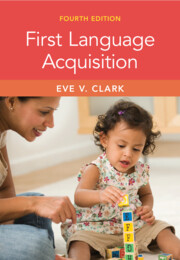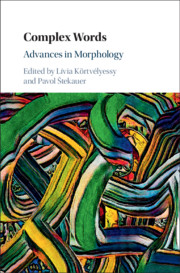9 results
4 - Construction Morphology and Relational Morphology
- from Part I - The Constructional View of Language
-
-
- Book:
- The Cambridge Handbook of Construction Grammar
- Published online:
- 30 January 2025
- Print publication:
- 06 February 2025, pp 101-128
-
- Chapter
- Export citation

First Language Acquisition
-
- Published online:
- 01 November 2024
- Print publication:
- 20 June 2024
-
- Textbook
- Export citation
Expletive insertion: a morphological approach
-
- Journal:
- English Language & Linguistics / Volume 28 / Issue 1 / March 2024
- Published online by Cambridge University Press:
- 19 June 2023, pp. 23-42
-
- Article
-
- You have access
- Open access
- HTML
- Export citation
7 - Derivational and Inflectional Affixes in Chinese and Their Morphosyntactic Properties
- from Part Two - Morpho-lexical Issues in Chinese
-
-
- Book:
- The Cambridge Handbook of Chinese Linguistics
- Published online:
- 04 August 2022
- Print publication:
- 18 August 2022, pp 135-157
-
- Chapter
- Export citation
3 - Morphological Constructions
-
- Book:
- Construction Grammar
- Published online:
- 20 September 2023
- Print publication:
- 28 July 2022, pp 48-102
-
- Chapter
- Export citation
17 - Onomatopoeia
- from Part III - Corpus-Based Case Studies
-
-
- Book:
- Complex Words
- Published online:
- 18 September 2020
- Print publication:
- 08 October 2020, pp 335-361
-
- Chapter
- Export citation

Complex Words
- Advances in Morphology
-
- Published online:
- 18 September 2020
- Print publication:
- 08 October 2020
The semantics of English out-prefixation: a corpus-based investigation
-
- Journal:
- English Language & Linguistics / Volume 25 / Issue 1 / March 2021
- Published online by Cambridge University Press:
- 09 March 2020, pp. 61-89
-
- Article
-
- You have access
- Open access
- HTML
- Export citation
From pause to word: uh, um and er in written American English
-
- Journal:
- English Language & Linguistics / Volume 23 / Issue 1 / March 2019
- Published online by Cambridge University Press:
- 04 September 2017, pp. 105-130
-
- Article
-
- You have access
- HTML
- Export citation

